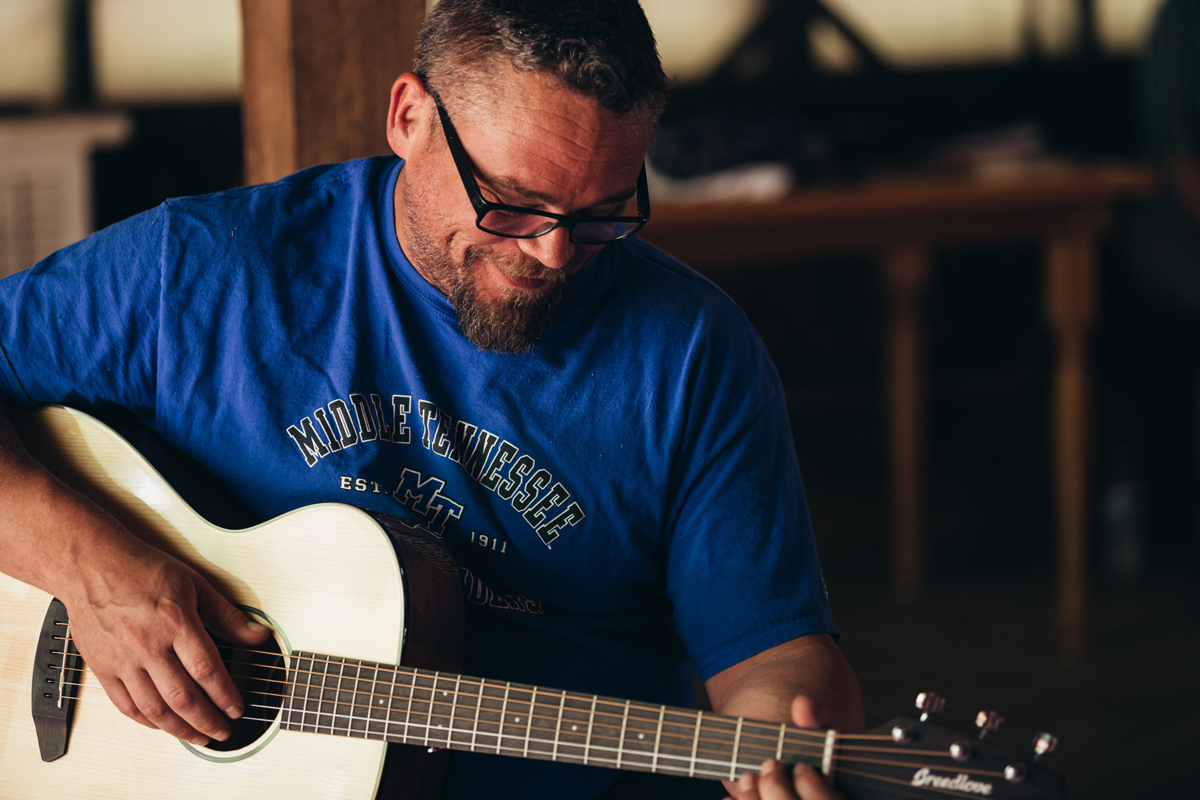
Putting a guitar in a soldier’s hands, no strings attached.
To Mack Bailey’s mind, it’s an act of peace, an offering that says you are valued, you have a voice, you can sing your story.
Of course there are strings attached, but only to the instrument, and they are tuned EADGBE.
Bailey is the founder of the Aspen, Colorado-based Music Therapy of the Rockies and he has found that pairing a veteran with a guitar can produce measurable results. He would know; he’s a board certified music therapist.
Bailey’s journey actually began with his own trauma. He is not a veteran, nor does he claim knowledge of any veteran’s particular strife, but his own pain was real enough to drive him down the road of helping others.
A touring musician, Bailey—a member of the appropriately dubbed Hard Travelers as well as a latter day edition of The Limeliters—was trying to escape a bad marriage and a life that had gone sour. Turning his music to healing, almost 20 years ago, was a way to repair his own broken psyche.
“I was suffering from deep depression that I never shared or made known to anybody. I never asked for any help. It got to the point where my thoughts were so dark that I had a plan to end my life, and was ready to carry it out. And at the last minute, I wrote a song.”
“I got fascinated by the fact of how that song re-wired my brain, and that’s where my program has come from. I believe that what I’m doing is re-wiring the brains of others through all these uses of music. I’m putting the brain in a position to accept the concept of therapy, and that is the first step that everybody needs to take.”
Music Therapy of the Rockies is a nonprofit dedicated to “an evidence-based therapeutic approach.”
To date, Bailey—who also trains other therapists—has staged workshops in cities like Nashville and Cleveland, touching the lives of over 70 proud Americans who gave heart and soul to their country only to find they may have given more than they realized.
“I want to change somebody’s life forever,” he says.
Guitars, Bailey has found, open a door. The untethered ownership establishes a bond of trust. Lessons give a sense of pride. And for those that use the instrument as a tool for writing, it opens new avenues of communication, allowing soldiers to locate and let fly emotions suppressed by fear, lack of esteem and shame.
“We’re trying to teach them to express themselves. Sometimes the guitar comes in handy, because we don’t always have the words for what we need to say. That’s where the music comes in, because music is what feelings sound like.”
Most importantly, says Bailey, whose father was an interpreter in the Korean conflict, guitars save lives.
“The whole goal, everything I’m doing, is designed to lower that number of 22 veterans a day that commit suicide. When I give them their guitar, I tell them, ‘When you were in the military, you had a weapon, a rifle that saved your life; this guitar is now your weapon, and it’s going to save your life again.’”
Through Music Therapy of the Rockies, Bailey, following an initial donation of six instruments, has purchased dozens of Discovery models from Breedlove, putting each in the hands of a worthy recipient.
Bailey is careful to not call them heroes. That word, he says, carries baggage of its own.
“When we call them heroes, we’re actually doing an enormous disservice to them. They’re struggling to be who they are, and when we put that label on them they then have to try to live up to that, as well. They just want to be normalized. They really just want to be in control of their stories, their memories, their experiences.”
Bailey emphasizes the role that science plays in his work, but, still, he has his own share of tales to tell from working with soldiers.
“The Veteran’s Administration wants data, as opposed to me saying, ‘Oh, man, look at the song they wrote, or look at how happy that soldier is holding that guitar.’ That doesn’t mean anything. I do a pre-survey, a post-survey and then a three-month follow-up with specific questions, so that I can show a trend from a PTSD scale.”
“I had a struggling veteran at my last retreat, and this guy (who’d been building his callouses) wrote on his evaluation sheet, that he was going to harden his fingers and soften his soul, which I thought was pretty powerful.”
Breedlove thanks Mack Bailey for his dedication to helping others, and for recognizing the power of music as a tool for positive change.
“It’s not what you get out of the music,” as Bailey loves to say, “but what the music gets out of you.”
For more information, visit www.musictherapyoftherockies.org
